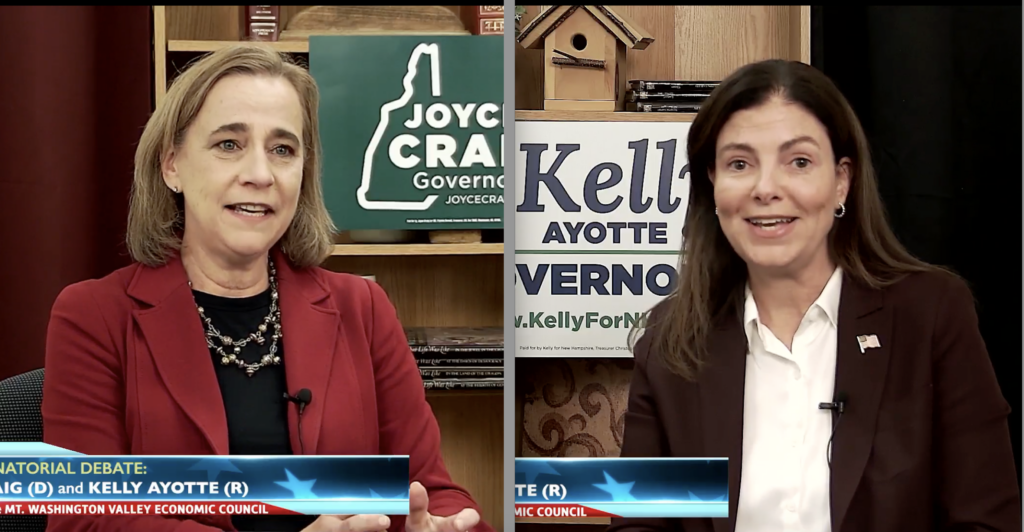During the recent debate hosted by the Mt. Washington Valley Economic Council on October 15, 2024, Democratic gubernatorial nominee Joyce Craig and Republican nominee Kelly Ayotte articulated various economic perspectives. Ayotte praised the upcoming elimination of the interest and dividends tax, which she sees as beneficial for the state, while Craig criticized this move, arguing that it disproportionately benefits the wealthy and essentially constitutes a tax break for affluent residents. This debate allowed both candidates to clarify their positions on key economic issues, but a crucial question regarding how to manage a potential billion-dollar revenue shortfall in the budget largely went unanswered. Moderator Jac Cuddy pressed the candidates for specific contingency plans should the state face a substantial drop in revenues in the following year.
Despite Cuddy’s attempts to elicit a clear dialogue on budgetary concerns, both candidates of the debate largely diverted their focus back to their established policy divides. With past years marked by robust state revenues driven by post-pandemic federal stimulus and strong business tax performance, there is an anticipation of financial decline ahead. As New Hampshire nears the end of its funding from the American Rescue Plan Act, projections indicate a dip in revenue, compounded by the forthcoming reduction in the interest and dividends tax. This anticipated budgetary crisis puts the next governor in a dilemma: either initiate tax increases or cut programs that serve state residents. However, neither candidate provided detailed strategies for addressing such a significant fiscal challenge during the debate.
The conversation also quickly evolved into a discussion of various legislative matters, particularly the 2022 abortion law enacted in New Hampshire, which significantly restricts abortion access after six months. The candidates diverged on education funding issues too. Ayotte opposed a recent court ruling that deemed the state’s public school funding inadequate, asserting that funding discussions are legislative matters, while Craig supported the ruling and cited the need for increased financial resources to alleviate local property tax burdens. Differences regarding the education freedom account program, which facilitates alternative schooling options for low-income families, also contributed to the contentious dialogue, with Craig warning of potential adverse effects on public schools.
Another point of contention involved housing policy. Both candidates expressed reluctance to override local zoning regulations but demonstrated support for certain zoning reforms. They both endorsed legislation aimed at increasing the development of accessory dwelling units within towns, indicating a willingness to engage in discussions on housing availability despite their fundamental reservations about state interference in local zoning. This reflects a nuanced approach where both nominees seek a balance between local authority and broader housing initiatives.
On the energy policy front, the debate saw differing views on clean energy initiatives. Ayotte argued that Craig’s proposals for enhancing clean energy would impose excessive financial burdens and mirror policies from other New England states. In contrast, Craig defended the necessity of such reforms for reducing the state’s carbon footprint and argued that these initiatives are ultimately aimed at lowering energy costs for residents. Their exchanges not only showcased contrasting approaches to energy sustainability but also highlighted different visions for the future of New Hampshire in addressing climate change and its associated costs.
Despite moments of pointed criticism directed toward each other—such as Ayotte’s accusations of Craig’s alignment with progressive policies akin to those in Massachusetts, and Craig’s rebuttal concerning Ayotte’s historical legislative decisions—key topics, like the looming budget deficit, remained insufficiently explored. As the debate wound down, Cuddy expressed his frustration at the lack of concrete answers regarding the pressing fiscal issues at hand, signaling a concern that voters may be left with critical questions unanswered as they head toward election day. This debate illuminated not just the candidates’ stark policy differences but also underscored the overarching fiscal uncertainties that the next gubernatorial administration will need to confront.

